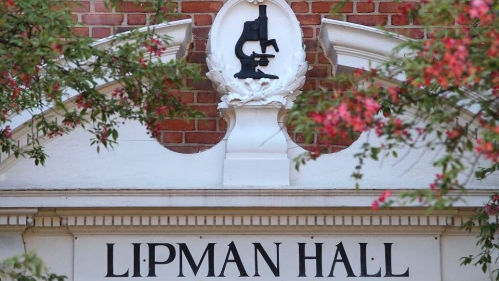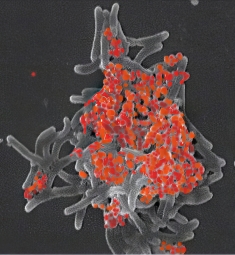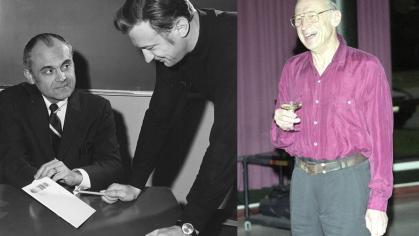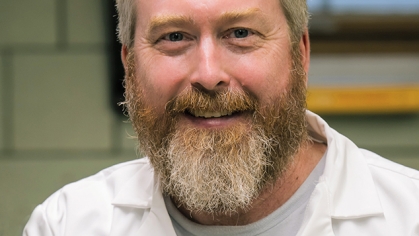Department of Biochemistry and Microbiology Home

Department of Biochemistry and Microbiology
Department Overview

Microorganisms are the smallest and oldest form of life on Earth. They also account for the greatest diversity in the biosphere, performing diverse metabolic functions and ecosystem services essential for life. Microbiology is the study of all aspects of microorganisms, encompassing bacteria, archaea, fungi, protists, and viruses; Biochemistry is the study of life processes of all living systems at the level of molecules and their interactions. Our department combines these disciplines in one comprehensive theme in studying fundamental life processes and their applications from molecules to biomes.
The department sustains the rich heritage of the disciplines of biochemistry and microbiology. Edward Voorhees established the Department of Soil Chemistry and Bacteriology in 1901, as the first agricultural microbiology department in the country. Biochemistry had its genesis in 1925 as the Department of Agricultural Biochemistry. In 1965, these departments merged to form what is now the Department of Biochemistry and Microbiology. Our academic programs serve the central mission of the School of Environmental and Biological Sciences, the New Jersey Agricultural Experiment Station, and Rutgers University through fundamental and applied research and instruction in microbiology and biochemistry. The fields of microbiology and biochemistry are major contributors to industrial development, human, animal, and plant health, environmental integrity, and agricultural productivity.
Academic Programs
Undergraduate
I was intrigued by Rutgers’ history of soil microbiology, especially the discovery of Streptomyces griseus that treats tuberculosis. Discovering the importance of beneficial microbes made me want to join the microbiology program at Rutgers to learn more.
Olivia Catalfamo '25
The department offers two undergraduate majors and minors: Biochemistry and Microbiology. The curricula cover the professional degree requirements for undergraduate and graduate programs and integrate well with the academic model of SEBS as a professional school. Each encompasses the entire complement of courses as they are recommended by corresponding professional organizations for the education and training of students heading into the workforce and further academic pursuits. Hands-on laboratory education is the foundation for excellence and student success. In addition, the department offers many of the core and advanced courses in biochemistry and microbiology required by other undergraduate majors at Rutgers, including the Microbial Biotechnology option of the Biotechnology major. To enhance the appreciation for microbiology and biochemistry by non-scientists, the department offers several introductory courses that provide a lecture and interdisciplinary-engaged learning experience for undergraduates with limited or no science background.
Graduate
The department provides key leadership for microbiology at Rutgers University and aims to broadly advance the diverse research and educational experience in the discipline offered at Rutgers and promote our rich traditions. This includes being the home base for the Graduate Program in Microbial Biology. This program is focused on fundamental microbial life processes and their applications. It offers a strong emphasis on understanding how microbes occupy every possible environmental niche on Earth (including frozen arctic tundra, deep sea hydrothermal vents, hazardous waste sites, and the human body) and how the diversity of microbial activities can be exploited to discover novel bioactive compounds, to characterize metabolic traits for degradation of hazardous chemicals, to develop new biofuel production methods, and to promote human health. Students are well-trained for their future careers in academia, government, and industry.
Diversity Statement
The Department of Biochemistry and Microbiology is composed of diverse peoples from diverse origins, using diverse disciplines to study the diversity of life and its mechanisms. We celebrate all dimensions of diversity.
In this time of profound change, it is apparent to us that racism and indifference to the disadvantaged is a systemic problem that demands a systemic solution. As a department of higher learning, our important role in addressing this problem is to remove obstacles hindering the success of our diverse undergraduate and graduate student body and to ensure that success is measured by ability, not access to resources. These students are the future of microbiology and biochemistry and it is our responsibility to ensure that they have the best possible chance to achieve their individual goals.
Highlights in the Department of Biochemistry and Microbiology
Honors
Fellow National Academy of Sciences, Fellow American Association for the Advancement of Science, Fellow of American Academy of Microbiology, Fellow Academy of Sciences of Latin America, Fellow Canadian Institute for Advanced Research (CIFAR), Vietnam Education Foundation Faculty Scholar, American Society for Microbiology US-Indo Professorship, American Society for Microbiology International Professorship for Latin America, International Society of Endocytobiology Miescher-Ishida Prize, Phycological Society of America Award of Excellence, Marie-Curie Scholar, Mycological Society of America Distinguished Mycologist, Hans Fischer Fellow, Darbaker Prize, NSF Young Investigator/Career Award, Society for Industrial Microbiology and Biotechnology Waksman Outstanding Teaching Award.

Accreditation

The Biochemistry Curriculum (Major 115) at the School of Environmental and Biological Sciences has received accreditation from the American Society for Biochemistry and Molecular Biology (ASBMB). This national recognition underscores the program's excellence, with rigorous standards, advanced coursework, and research opportunities, preparing students for careers in science, healthcare, and biotechnology.
Sign Up for the Lipman Log Newsletter


